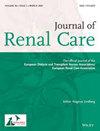Progressive Evaluation of Determinants of Fatigue in Patients Undergoing Haemodialysis
Abstract
Background
Fatigue is a subjective and complex issue that commonly occurs in patients undergoing haemodialysis and significantly affects quality of life. A wide range of factors, including demographic, physiological, and psychological variables, influence the experience of fatigue in patients receiving haemodialysis.
Objective
This study was conducted to determine the level of fatigue in patients receiving haemodialysis and to hierarchically evaluate the effects of demographic, physiological, and psychological variables that contribute to fatigue.
Design
It is a descriptive cross-sectional study.
Participants
The study recruited 165 patients undergoing haemodialysis, and it was carried out at three local general hospitals in Turkey that offer maintenance haemodialysis.
Measurements
Data was collected using Piper Fatigue Scale, Pittsburgh Sleep Quality Index and Hospital Anxiety and Depression Scale. Additionally, a descriptive information form comprising questions derived from the literature and expert opinions was utilised to identify the demographic and laboratory markers of individuals. A form consisting of validated questionnaires was used for sociodemographic data. Stepwise multiple regression analysis was used to assess the extent to which demographic, physiological, and psychological variables predict fatigue.
Results
The individuals included in the study (n = 165) had a mean age of 60.9 ± 14.43 years, 55.4% were male, and 62.4% had received primary school education. The study identified high levels of fatigue, anxiety, depression, and poor sleep quality in patients undergoing haemodialysis. Our study revealed that a combination of age, gender, anxiety and depression levels, albumin levels, and sleep quality accounted for 39.1% of the variance in fatigue levels. Specifically, demographic and laboratory variables explained 18.6% of the variance, anxiety and depression levels contributed 14.5%, and sleep quality accounted for 6%. These results underscore the substantial impact of psychological factors in fatigue among patients receiving haemodialysis.
Conclusion
Mood and sleep quality are associated with fatigue in patients undergoing haemodialysis. Comprehensive interventions targeting these factors may help reduce the severity of fatigue and its associated functional impairment.

 求助内容:
求助内容: 应助结果提醒方式:
应助结果提醒方式:


